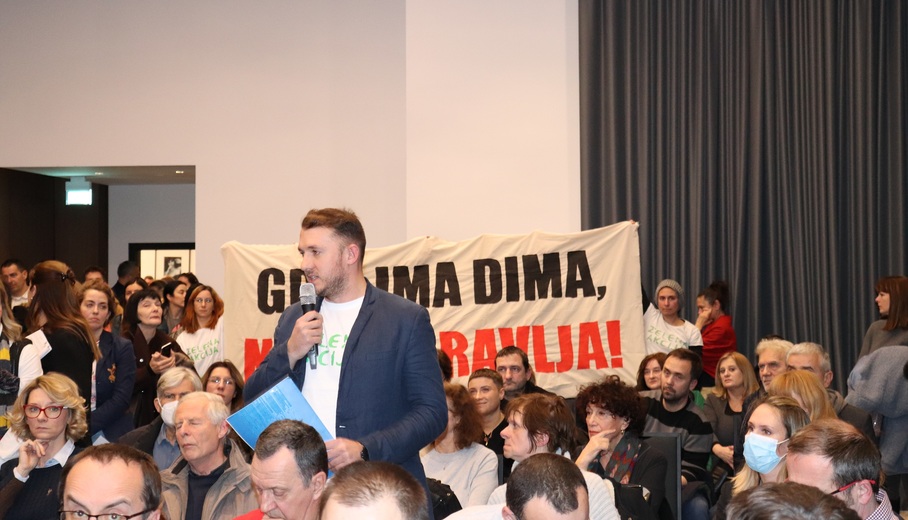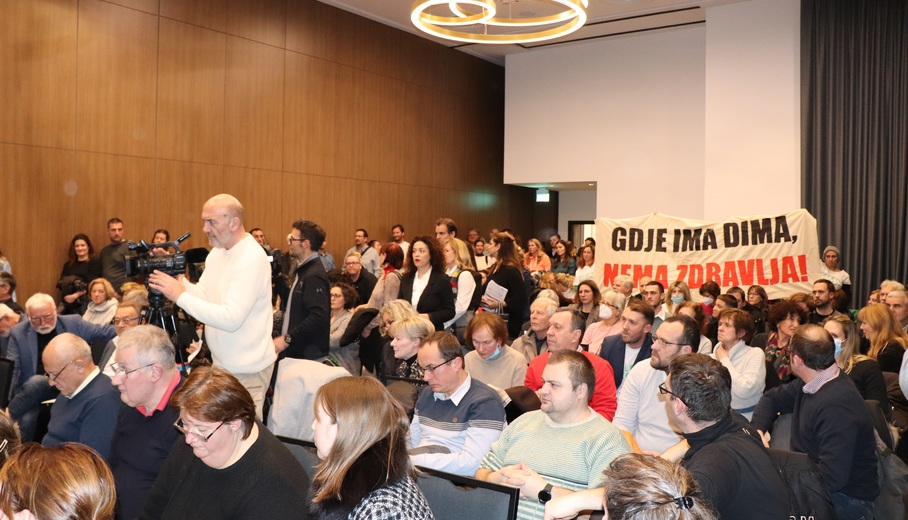Where there is smoke, there is no health! STOP the incinerator!
The hospital KBC Zagreb and the Ministry of Economy and Sustainable Development should abandon the construction of an infectious waste incinerator due to the significant threat to the population and the environment, financial unsustainability and non-compliance with the City of Zagreb's spatial planning documentation.
This is the message Zelena akcija/FoE Croatia sent during a public presentation of the Environmental Impact Study (EIA) for the planned incinerator. Activists put up a banner with the message "Where there is smoke, there is no health. STOP the incinerator" to warn about the Study's shortcomings and highlight more sustainable solutions. At the same time, they supported the newly created citizens' initiative and invited the public to participate in the public debate until January 30.

"This Study is a bad attempt to justify the construction of the incinerator. Although several infectious waste recovery methods are applied worldwide, the EIA does not consider other solutions. The absence of analysis is not surprising because it would show that there are more acceptable solutions than burning. It is already clear hat this research is unprofessional and made up to back up the needs of investors", said Marko Košak from Zelena akcija. He pointed out that incinerators are at the bottom of the waste disposal priorities prescribed by the EU and the World Health Organization. One of the better solutions is autoclaving (steam sterilization), which turns hazardous waste into non-hazardous and a good part can be recycled. In this way, resources and energy are saved, much more than would be obtained by burning them.
No matter how modern they are, waste incinerators emit harmful gases such as dioxin, furan and heavy metals, often exceeding the permitted values. This pollutes the air and harms health, especially during long-term exposure. "The EIA does not provide satisfactory solutions for preventing emissions nor for dealing with problems in plant operation. The control of competent state institutions is also questionable, considering the inertness in cases like Marišćina and Kaštijun. Relying on the efficiency of these irresponsible institutions is an unacceptable risk", commented Košak.

In addition to playing around with health, the KBC and the Ministry also play with citizens' money. "Incinerators are the most expensive way of waste disposing", Košak said. He explained that operating costs are high, in addition to the investment cost, due to the need to change and disposal of toxic filters and the high costs of disposal of the generated poisonous ash. Waste does not have a financial analysis that would include all fees. Thus, the project's economic viability is questionable.
FoE Ctoatia also believes that the waste incinerator on the premises of KBC Rebro is not in accordance with Zagreb's General Urban Plan (GUP). It prescribes that what serves the basic purpose of KBC, which is health care, may be built on that space. The incinerator falls outside the function of the fundamental purpose of KBC Rebro, especially considering solid infectious medical waste from five hospitals. For this reason, FoE Croatia sent a message to the Ministry of Physical Planning, Construction and State Assets demanding a decision on non-compliance with the GUP.
"The KBC should protect the population's health, not damage it, and the role of the Ministry is to select sustainable solutions instead of approving non-expert studies. We call on both institutions to immediately stop this senseless incinerator because otherwise, we can expect even fiercer resistance from the residents", concluded Košak.



